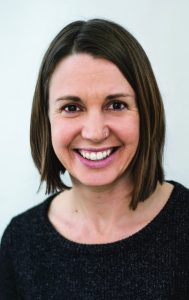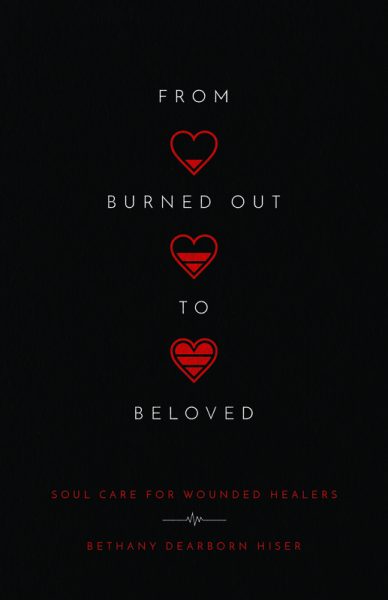guest post by Bethany Dearborn Hiser
To be honest, I never would have imagined I’d be here: sharing about trauma-informed soul care, let alone an upcoming book that I wrote on the topic.
I used to think self-care was trivial. It was a luxury I didn’t need or deserve. I felt guilty taking time for myself in the face of so much injustice and poverty. I thought my passion for the work would carry me through. Then I burned out.
From Burned Out to Beloved: Soul Care for Wounded Healers is a bit of my journey, but more than that it’s a trauma-informed soul care guide for people of faith working in high-stress, helping professions.
As a bilingual social worker, chaplain, and pastoral advocate, I worked in a variety of ministry and social service settings with people affected by addiction, sexual exploitation, incarceration, and immigration. Although I encouraged and walked with others in their substance recovery journeys, little did I know the recovery journey I needed to take.
Secondary trauma, my own workplace codependency, and a variety of other factors led to utter exhaustion and burnout.
As I’ve worked through these barriers to self-care, I’ve come to see that taking care of myself involves deeper inner healing and recovery, as well as more integrated practices than occasional excursions to the salon. For me, this is about connection to God who not only sustains and partners with me, but also helps me to accept my brokenness and tend to my wounds. It involves knowing that I am beloved regardless of what I do.
Laura van Dernoot Lipsky’s Trauma Stewardship book connected significant dots for me—revealing my level of secondary trauma and illuminating the reality that I wasn’t alone. Yet I still thirsted for more. I needed something that was rooted in identity as God’s beloved, and integrated spiritual practices, and inner healing recovery work.
I took one step after another in my own recovery and healing, and eventually began doing trainings for others, sharing what I was learning. The material I wrote grew to a 20-page handout…and I kept writing, kept sensing the still small voice, saying: write!
I never intended to write a book, yet I kept hearing that I wasn’t alone, that others were also burning out and needing recovery from secondary trauma. I’d hear stories of friends of friends who after years of planning and prayer, had finally started a non-profit or community organization or moved somewhere to work with women who were sexually exploited…and it was too much. Burnout.
So, I wrote for people who wouldn’t normally pick up a self-help book (like myself). I wrote for those who are engaged on the frontlines of ministry, social work, helping professions. I wrote for those who need a reorientation of self-care in order to be well in their work and life. I wrote to help readers unpack their false narratives, explore their identity as beloveds of God, and learn how to thrive.
We are beloved and broken. We need to know and tend to ourselves in order to be well and love others well, and because we are loved. In order to change, we need to explore the beliefs and trauma that drive our unhealthy behaviors and not just make a self-care plan. Doing so is essential for our health and those we seek to help.
I am still on the journey–pursuing recovery as a social justice codependent workaholic. I still forget to take bathroom breaks, to prioritize my daily practice, and to remember that I’m beloved, no matter what. I don’t have this figured out. Yet I’m also witnessing how our greatest burden can become the source of our greatest gift. The suffering I experienced through burnout has led to this book and to my passion to care for others who are affected by secondary trauma. I am so grateful that this is part of what I get to offer to this world.
Now, as a fellow wounded healer, I lead trauma-informed soulcare workshops internationally and mentor helping professionals. I work as the Director of Soul Care for Northwest Family Life, a network of therapists trained to work with survivors of domestic violence and sexual trauma.
I’d be honored to have you join me on the journey. This October, I’m offering a From Burned Out to Beloved Retreat in Daily Life. Dig into your own journey and join others around the globe in reading a pre-release copy of the book. If you’re feeling weary, looking to re-orient your identity as a beloved one and explore your false narratives, this is for you.
Apply here to join this put-it-into-practice book group, and go here for more info.
Bio for Bethany Dearborn Hiser
 Bethany Dearborn Hiser is the director of soul care for Northwest Family Life, a network of therapists trained to work with survivors of domestic violence and sexual trauma. As a bilingual social worker, chaplain, and pastoral advocate, Hiser has worked in a variety of ministry and social service settings with people affected by addiction, sexual exploitation, incarceration, and immigration. She and her husband, Kenny, live in Seattle with their two young children.
Bethany Dearborn Hiser is the director of soul care for Northwest Family Life, a network of therapists trained to work with survivors of domestic violence and sexual trauma. As a bilingual social worker, chaplain, and pastoral advocate, Hiser has worked in a variety of ministry and social service settings with people affected by addiction, sexual exploitation, incarceration, and immigration. She and her husband, Kenny, live in Seattle with their two young children.
NOTE: We receive a small amount for purchases made on Amazon through appropriate links above.

